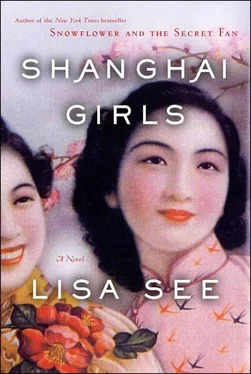
For my cousin Leslee Leong,
my cohort in memory keeping
Shanghai Girls takes place between 1937 and 1957. Readers will find some of what today we would call politically incorrect terms, but they are accurate to the time. I have used the Wade-Giles system of transliteration for Chinese words-whether in Mandarin, Cantonese, or in the Sze Yup and Wu dialects-again in keeping with the era.
Regarding exchange rates: Silver dollars were used in Shanghai before November 1935; Chinese yuan were used after 1935. The two were roughly equivalent. I have chosen to stay with dollars and cents because some were still in circulation and they are a more familiar currency to Western readers. The copper-silver exchange rate ranged from 300 to 330 coppers for every silver dollar (or yuan) .
“OUR DAUGHTER LOOKS like a South China peasant with those red cheeks,” my father complains, pointedly ignoring the soup before him. “Can’t you do something about them?”
Mama stares at Baba, but what can she say? My face is pretty enough-some might even say lovely-but not as luminescent as the pearl I’m named for. I tend to blush easily. Beyond that, my cheeks capture the sun. When I turned five, my mother began rubbing my face and arms with pearl creams, and mixing ground pearls into my morning jook- rice porridge-hoping the white essence would permeate my skin. It hasn’t worked. Now my cheeks burn red-exactly what my father hates. I shrink down into my chair. I always slump when I’m near him, but I slump even more on those occasions when Baba takes his eyes off my sister to look at me. I’m taller than my father, which he loathes. We live in Shanghai, where the tallest car, the tallest wall, or the tallest building sends a clear and unwavering message that the owner is a person of great importance. I am not a person of importance.
“She thinks she’s smart,” Baba goes on. He wears a Western-style suit of good cut. His hair shows just a few strands of gray. He’s been anxious lately, but tonight his mood is darker than usual. Perhaps his favorite horse didn’t win or the dice refused to land his way. “But one thing she isn’t is clever.”
This is another of my father’s standard criticisms and one he picked up from Confucius, who wrote, “An educated woman is a worthless woman.” People call me bookish, which even in 1937 is not considered a good thing. But as smart as I am, I don’t know how to protect myself from my father’s words.
Most families eat at a round dining table, so they will always be whole and connected, with no sharp edges. We have a square teakwood table, and we always sit in the exact same places: my father next to May on one side of the table, with my mother directly across from her so that my parents can share my sister equally. Every meal-day after day, year after year-is a reminder that I’m not the favorite and never will be.
As my father continues to pick at my faults, I shut him out and pretend an interest in our dining room. On the wall adjoining the kitchen, four scrolls depicting the four seasons usually hang. Tonight they’ve been removed, leaving shadow outlines on the wall. They aren’t the only things missing. We used to have an overhead fan, but this past year Baba thought it would be more luxurious to have servants fan us while we ate. They aren’t here tonight and the room is sweltering. Ordinarily an art deco chandelier and matching wall sconces of etched yellow-and-rose-tinted glass illuminate the room. These are missing as well. I don’t give any of this much thought, assuming that the scrolls have been put away to prevent their silken edges from curling in the humidity, that Baba has given the servants a night off to celebrate a wedding or birthday with their own families, and that the lighting fixtures have been temporarily taken down for cleaning.
Cook-who has no wife and children of his own-removes our soup bowls and brings out dishes of shrimp with water chestnuts, pork stewed in soy sauce with dried vegetables and bamboo shoots, steamed eel, an eight-treasures vegetable dish, and rice, but the heat swallows my hunger. I would prefer a few sips of chilled sour plum juice, cold mint-flavored sweet green bean soup, or sweet almond broth.
When Mama says, “The basket repairer charged too much today,” I relax. If my father is predictable in his criticisms of me, then it’s equally predictable that my mother will recite her daily woes. She looks elegant, as always. Amber pins hold the bun at the back of her neck perfectly in place. Her gown, a cheongsam made of midnight blue silk with midlength sleeves, has been expertly tailored to fit her age and status. A bracelet carved from a single piece of good jade hangs from her wrist. The thump of it when it hits the table edge is comforting and familiar. She has bound feet, and some of her ways are just as antiquated. She questions our dreams, weighing the meaning of the presence of water, shoes, or teeth as good or bad omens. She believes in astrology, blaming or praising May and me for one thing or another because we were born in the Year of the Sheep and the Year of the Dragon, respectively.
Mama has a lucky life. Her arranged marriage to our father seems relatively peaceful. She reads Buddhist sutras in the morning, takes a rickshaw to visit friends for lunch, plays mah-jongg until late in the day, and commiserates with wives of similar station about the weather, the indolence of servants, and the ineffectiveness of the latest remedies for their hiccups, gout, or hemorrhoids. She has nothing to fret about, but her quiet bitterness and persistent worry infuse every story she tells us. “There are no happy endings,” she often recites. Still, she’s beautiful, and her lily gait is as delicate as the swaying of young bamboo in a spring breeze.
“That lazy servant next door was sloppy with the Tso family’s nightstool and stunk up the street with their nightsoil,” Mama says. “And Cook!” She allows herself a low hiss of disapproval. “Cook has served us shrimp so old that the smell has made me lose my appetite.”
We don’t contradict her, but the odor suffocating us comes not from spilled nightsoil or day-old shrimp but from her. Since we don’t have our servants to keep the air moving in the room, the smell that rises from the blood and pus that seep through the bandages holding Mama’s feet in their tiny shape clings to the back of my throat.
Mama is still filling the air with her grievances when Baba interrupts. “You girls can’t go out tonight. I need to talk to you.”
He speaks to May, who looks at him and smiles in that beautiful way of hers. We aren’t bad girls, but we have plans tonight, and being lectured by Baba about how much water we waste in our baths or the fact that we don’t eat every grain of rice in our bowls isn’t part of them. Usually Baba reacts to May’s charm by smiling back at her and forgetting his concerns, but this time he blinks a few times and shifts his black eyes to me. Again, I sink in my chair. Sometimes I think this is my only real form of filial piety, making myself small before my father. I consider myself to be a modern Shanghai girl. I don’t want to believe in all that obey, obey, obey stuff girls were taught in the past. But the truth is, May-as much as they adore her-and I are just girls. No one will carry on the family name, and no one will worship our parents as ancestors when the time comes. My sister and I are the end of the Chin line. When we were very young, our lack of value meant our parents had little interest in controlling us. We weren’t worth the trouble or effort. Later, something strange happened: my parents fell in love-total, besotted love-with their younger daughter. This allowed us to retain a certain amount of liberty, with the result that my sister’s spoiled ways are often ignored, as is our sometimes flagrant disregard for respect and duty. What others might call unfilial and disrespectful, we call modern and unbound.
Читать дальше













